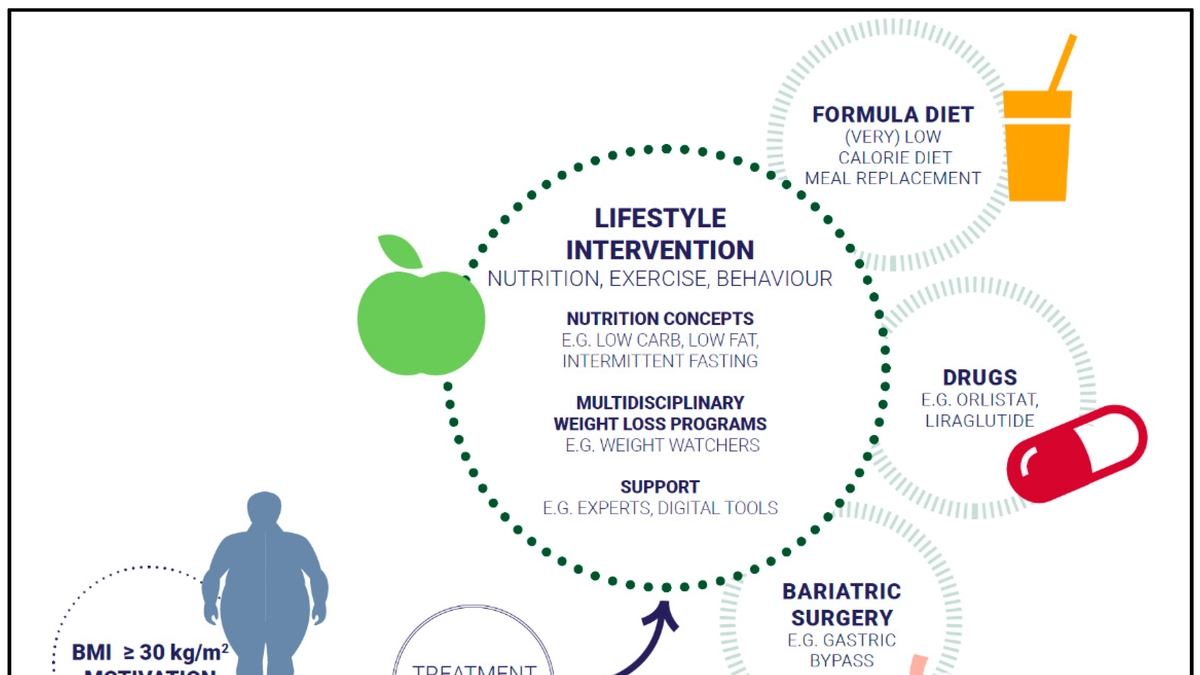
Obesity is a complex health condition that can significantly impact an individual’s quality of life. It requires a comprehensive and sustainable approach to effectively manage and reduce weight. Here we provide a round-up of 10 evidence-based weight-loss strategies that can help individuals with obesity achieve their health goals and improve their overall well-being.
1. Embrace Healthy Eating Patterns
Adopting a balanced diet is crucial for weight loss. This includes consuming a variety of fruits and vegetables, lean proteins, whole grains, and healthy fats. Avoiding sugary drinks and excessive consumption of processed foods can also contribute to a healthier eating pattern.
2. Regular Physical Activity
Regular exercise can help burn calories, improve metabolism, and enhance overall health. It is recommended to engage in moderate-intensity activity for at least 150 minutes per week or vigorous-intensity activity for 75 minutes per week.
3. Stress Management
Chronic stress can lead to unhealthy eating habits and weight gain. Activities such as yoga, meditation, and deep breathing can help manage stress levels and promote a healthier lifestyle.
4. Set Realistic Goals
Setting realistic and achievable weight loss goals can promote motivation and adherence to healthy behaviors. It’s essential to remember that sustainable weight loss takes time and patience.
5. Create a Supportive Environment
A supportive environment can significantly influence weight loss success. This includes the availability of healthy foods at home, a safe neighborhood for physical activity, and emotional support from friends and family.
6. Portion Control and Calorie Awareness
Being aware of portion sizes and the caloric content of foods can help manage calorie intake, which is essential for weight loss. Keeping a food journal might be helpful in tracking calorie intake and identifying unhealthy eating patterns.
7. Prioritize Good Sleep
Research shows that poor sleep can interfere with weight loss efforts. Therefore, it’s crucial to prioritize good sleep hygiene for optimal health and weight management.
8. Seek Professional Help
Obesity is a complex health condition that may require professional assistance. Health professionals can provide tailored advice and treatments based on individual needs, including the use of medications such as GLP-1 receptor agonists, which have shown promise in promoting weight loss.
9. Intermittent Fasting and Mediterranean Diet
Adopting specific dietary approaches like intermittent fasting or the Mediterranean diet can also contribute to weight loss. These methods focus on when to eat and what to eat, respectively, and have been shown to be effective in managing weight.
10. Consider Gastric Balloon Procedure
For some individuals, a gastric balloon procedure may be a viable temporary treatment for obesity. This non-surgical procedure involves placing a saline-filled balloon in the stomach to promote a feeling of fullness and reduce food intake. However, this option should be considered only after discussing potential risks and benefits with a healthcare provider.
In conclusion, weight loss in obesity requires a multifaceted approach, including lifestyle modifications, dietary changes, physical activity, stress management, and in some cases, medical treatments. It’s important to remember that every individual is unique, and what works for one person may not work for another. Therefore, it’s crucial to find a weight-loss strategy that fits your lifestyle and preferences. Remember, the journey to a healthier you is a marathon, not a sprint. Patience, persistence, and self-compassion are key to long-term success.
